Lessico
Teofrasto
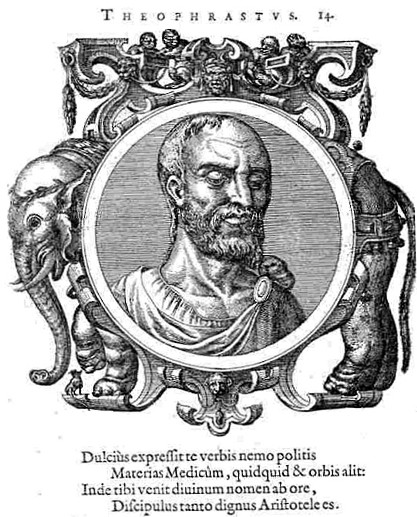
Icones veterum aliquot ac recentium Medicorum
Philosophorumque
Ioannes Sambucus / János Zsámboky![]()
Antverpiae 1574
Filosofo
greco (Ereso, isola di Lesbo, ca. 370 - Atene ca. 285 aC). Il suo nome era
Tirtamo, Týrtamos, ma a quanto pare fu Aristotele![]() a battezzarlo Teofrasto - Θεόφραστος - per
indicare la grazia della sua conversazione, Theós = Dio e phrástës =
eloquente, che parlava da dio diremmo oggi.
a battezzarlo Teofrasto - Θεόφραστος - per
indicare la grazia della sua conversazione, Theós = Dio e phrástës =
eloquente, che parlava da dio diremmo oggi.
Nato da ricca
famiglia, dapprima seguì qualche lezione di Platone![]() ad Atene, ma poi si unì ad Aristotele
e ne divenne il più stretto discepolo, fino a sostituirlo a capo della scuola
peripatetica.
ad Atene, ma poi si unì ad Aristotele
e ne divenne il più stretto discepolo, fino a sostituirlo a capo della scuola
peripatetica.
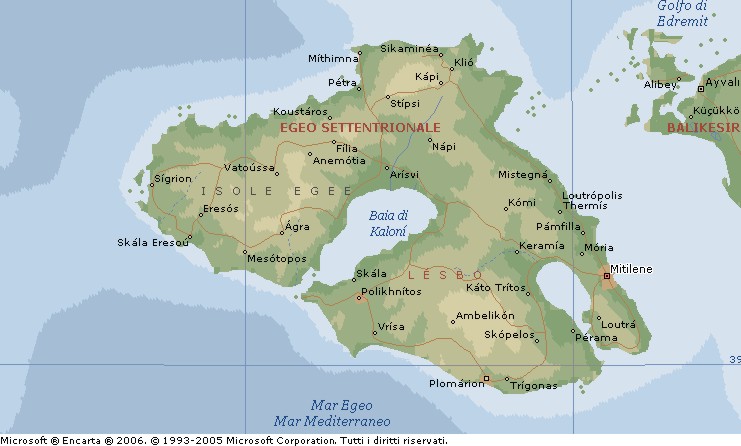
Aristotele, quando andò ad Asso, nella Troade, alla corte del tiranno Ermia, dove esisteva una comunità filosofico-politica di tipo platonico, fu proprio ad Asso che probabilmente conobbe Teofrasto, col quale si recò nel 345-344 a Mitilene sull’isola di Lesbo.
La produzione di Teofrasto fu immensa, in molti campi del sapere: Ricerca sulle piante e Le cause delle piante, ampie opere che classificano e descrivono il regno vegetale e la sua vita, La metafisica, un trattato Sulle sensazioni e una serie di brevi trattati scientifici, infine i celebri Caratteri morali, operetta costituita da 30 brevi descrizioni di tipi umani, che rientrava probabilmente negli studi di etica.
Si sa che scrisse anche di storia, di retorica, di poetica, di etica, di politica. Teofrasto dimostra una grande capacità critica ed elaborativa del pensiero aristotelico. Fu soprattutto un erudito.
Nel
1644 veniva pubblicata ad Amsterdam la traduzione dell'Historia plantarum
curata da Johannes Bodaeus van Stapel![]() dal titolo: Theophrastus Eresius. De Historia Plantarum Libri Decem, Graece &
Latine. In quibus textum Graecum variis lectionibus, emendationibus, hiulcorum
supplementis:... item rariorum plantarum iconibus illustravit Joannes Bodaeus
a Stapel, medicus amstelodamensis, accesserunt Iulii Caesaris Scaligeri
dal titolo: Theophrastus Eresius. De Historia Plantarum Libri Decem, Graece &
Latine. In quibus textum Graecum variis lectionibus, emendationibus, hiulcorum
supplementis:... item rariorum plantarum iconibus illustravit Joannes Bodaeus
a Stapel, medicus amstelodamensis, accesserunt Iulii Caesaris Scaligeri![]() ,
in eosdem libros animadversiones: et Roberti Constantini, annotationes cum
indice locupletissimo, Amstelodami,
1644.
,
in eosdem libros animadversiones: et Roberti Constantini, annotationes cum
indice locupletissimo, Amstelodami,
1644.
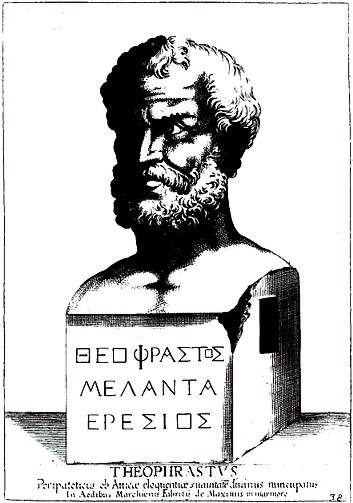
da Veterum illustrium philosophorum etc. imagines
(1685)
di Giovanni Pietro Bellori (Roma 1613-1696)
Theophrastus (Greek: Θεόφραστος; 371 – c. 287 BC), a native of Eressos in Lesbos, was the successor of Aristotle in the Peripatetic school. His interests were wide-ranging, extending from biology and physics to ethics and metaphysics. His two surviving botanical works, Enquiry into Plants and On the Causes of Plants, were an important influence on medieval science. There are also surviving works On Moral Characters, On Sensation, On Stones, and fragments on Physics and Metaphysics. In philosophy, he studied grammar and language, and continued Aristotle's work on logic. He also regarded space as the mere arrangement and position of bodies, time as an accident of motion, and motion as a necessary consequence of all activity. In ethics, he regarded happiness as depending on external influences as well as on virtue, and famously said that "life is ruled by fortune, not wisdom."
Life
All the biographical information we have of him was provided by Diogenes Laërtius' Lives of the Philosophers, written four hundred years after Theophrastus' time, though "there is no intrinsic improbability in most of what Diogenes records." His given name was Tyrtamus (Týrtamos), but he later became known by the nickname "Theophrastus", given to him, it is said, by Aristotle to indicate the grace of his conversation (ancient Greek: Theós = God and phrástës = eloquent i.e divine expression).
According to some sources, Theophrastus' father was named Messapus, and was married to a woman named Argiope and was the father of Cercyon -- but, this is not certain.
After receiving his first introduction to philosophy in Lesbos from one Leucippus or Alcippus, he proceeded to Athens, and became a member of the Platonist circle. After Plato's death he attached himself to Aristotle, and in all probability accompanied him to Stagira. The intimate friendship of Theophrastus with Callisthenes, the fellow-pupil of Alexander the Great, the mention made in his will of an estate belonging to him at Stagira, and the repeated notices of the town and its museum in the nine books of his Enquiry into Plants and his six books of Causes of Plants point to this conclusion.
Aristotle in his will made him guardian of his children, of whom Nicomachus also became his eromenos. Aristotle likewise bequeathed to him his library and the originals of his works, and designated him as his successor at the Lyceum on his own removal to Chalcis. Eudemus of Rhodes also had some claims to this position, and Aristoxenus is said to have resented Aristotle's choice.
Theophrastus presided over the Peripatetic school for thirty-five years, and died at the age of eighty-five according to Diogenes. He is said to have remarked "we die just when we are beginning to live".
Under his guidance the school flourished greatly— there were at one period more than 2000 students, Diogenes affirms, and at his death, according to the terms of his will preserved by Diogenes, he bequeathed to it his garden with house and colonnades as a permanent seat of instruction. The comic poet Menander was among his pupils. His popularity was shown in the regard paid to him by Philip, Cassander and Ptolemy, and by the complete failure of a charge of impiety brought against him. He was honoured with a public funeral, and "the whole population of Athens, honouring him greatly, followed him to the grave." He was succeeded as head of the Lyceum by Strato of Lampsacus.
Writings
From the lists of Diogenes Laërtius, giving 227 titles, it appears that the activity of Theophrastus extended over the whole field of contemporary knowledge. His writing probably differed little from Aristotle's treatment of the same themes, though supplementary in details.
Thus Theophrastus, like Aristotle, had composed a first and second Analytic. He had also written books on Topics; on the refutation of fallacies; as well as books on the Principles of Natural Philosophy (Physica Auscultatio), on Heaven, and on Meteorological Phenomena. The work of Theophrastus On Affirmation and Denial seems to have corresponded to that of Aristotle's On Judgment.
In addition, he wrote on the Warm and the Cold, on Water, Fire, the Sea, on Coagulation and Melting, on various phenomena of organic and spiritual life, and on the Soul and Sensuous Perception. Likewise we find mention of monographs of Theophrastus on the early Greek philosophers Anaximenes, Anaxagoras, Empedocles, Archelaus, Diogenes of Apollonia, Democritus, which were made use of by Simplicius; and also on Xenocrates, against the Academics, and a sketch of the political doctrine of Plato. That he studied general history, as we see from the quotations in Plutarch's lives of Lycurgus, Solon, Aristides, Pericles, Nicias, Alcibiades, Lysander, Agesilaus, and Demosthenes, which were probably borrowed from the work on Lives. But his main efforts were to continue the labours of Aristotle in Natural History. This is testified not only by a number of treatises on individual subjects of zoology, of which, besides the titles, only fragments remain, but also by his books on Stones, his Enquiry into Plants, and On the Causes of Plants, which have come down to us entire. In politics, also, he seems to have trodden in the footsteps of Aristotle. Besides his books on the State, we find quoted various treatises on Education, on Royalty, on the Best State, on Political Morals, and particularly his works on the Laws, one of which, containing a recapitulation of the laws of various barbarian as well as Greek states, was intended to be a companion to Aristotle's outline of Politics, and must have been similar to it. He also wrote on oratory and poetry. Theophrastus, without doubt, departed further from Aristotle in his ethical writings, as also in his metaphysical investigations respecting motion, the soul, and God.
Besides these writings, Theophrastus was the author of several collections of problems, out of which some things at least have passed into the Problems which have come down to us under the name of Aristotle, and commentaries, partly dialogues, to which probably belonged the Erotikos, Megacles, Callisthenes, and Megarikos, and letters, partly books on mathematical sciences and their history.
Many of his works which we do have, exist only in fragmentary form. "The style of these works, as of the botanical books, suggests that, as in the case of Aristotle, what we possess consists of notes for lectures or notes taken of lectures," his translator Arthur Hort remarks. "There is no literary charm; the sentences are mostly compressed and highly elliptical, to the point sometimes of obscurity." The text of these fragments and extracts is often so corrupt that the well-known story of the fate of the books of Aristotle and Theophrastus (see Apellicon) might very well be true.
On Plants
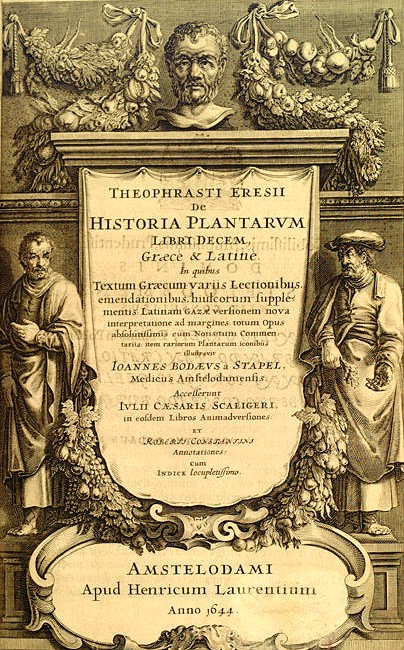
Frontispiece
to the illustrated 1644 edition
of the Enquiry into Plants - Historia Plantarum
The most important of his books are two large botanical treatises, Enquiry into Plants, and On the Causes of Plants, which constitute the most important contribution to botanical science during antiquity and the Middle Ages, the first systemization of the botanical world; on the strength of these works some call him the "father of Taxonomy".
The Enquiry into Plants was originally ten books, of which nine survive. The work is arranged into a system whereby plants are classified according to their modes of generation, their localities, their sizes, and according to their practical uses such as foods, juices, herbs, etc. The first book deals with the parts of plants; the second book with the reproduction of plants and the times and manner of sowing; the third, fourth and fifth books are devoted to trees, their types, their locations, and their practical applications; the sixth book deals with shrubs and spiny plants; the seventh book deals with herbs; the eighth book deals with plants which produce edible seeds; and the ninth book deals with plants which produce useful juices, gums, resins, etc.
On the Causes of Plants was originally eight books, of which six survive. It concerns the growth of plants; the influences on their fecundity; the proper times they should be sown and reaped; the methods of preparing the soil, manuring it, and the use of tools; of the smells, tastes, and properties of many types of plants. The work deals mainly with the economical uses of plants rather than their medicinal uses, although the latter is sometimes mentioned.
Although these works contain many absurd and fabulous statements, as a whole they have many valuable observations concerning the functions and properties of plants. Theophrastus detected the process of germination and realized the importance of climate and soil to plants. Much of the information on the Greek plants may have come from his own observations, as he is known to have travelled throughout Greece, and to have had a botanical garden of his own; but the works also profit from the reports on plants of Asia brought back from those who followed Alexander; "to the reports of Alexander's followers he owed his accounts of such plants as the cotton-plant, banyan, pepper, cinnamon, myrrh and frankincense." (Hort).
Theophrastus' Enquiry into Plants was first published in a Latin translation by Theodore Gaza, at Treviso, 1483; in its original Greek it first appeared from the press of Aldus Manutius at Venice, 1495-98, from a third-rate manuscript, which, like the majority of the manuscripts that were sent to printers' workshops in the fifteenth and sixteenth century, has disappeared. Wimmer identified two manuscripts of first quality, the Codex Urbinas in the Vatican Library, which was not made known to J.G. Schneider, who made the first modern critical edition, 1818-21, and the excerpts in the Codex Parisiensis in the Bibliothèque nationale de France.
The Characters
His book The Characters, if it is indeed his, deserves a separate mention. The work contains thirty brief, vigorous and trenchant outlines of moral types, which form a most valuable picture of the life of his time, and in fact of human nature in general. They are the first recorded attempt at systematic character writing. The book has been regarded by some as an independent work; others incline to the view that the sketches were written from time to time by Theophrastus, and collected and edited after his death; others, again, regard the Characters as part of a larger systematic work, but the style of the book is against this. Theophrastus has found many imitators in this kind of writing, notably Hall (1608), Sir Thomas Overbury (1614–16), Bishop Earle (1628) and Jean de La Bruyère (1688), who also translated the Characters. George Eliot also took inspiration from Theophrastus' Characters, most notably in her book of caricatures, Impressions of Theophrastus Such. Writing the "character sketch" as a scholastic exercise also originated in Theophrastus's typology.
On Sensation
A treatise on sensuous perception and its objects is important for a knowledge of the doctrines of the more ancient Greek philosophers regarding the subject. With this type of work we may connect the fragments on Smells, on Fatigue, on Dizziness, on Sweat, on Swooning, on Palsy, and on Honey.
Physics
We also possess in fragments a History of Physics. To this class of work belong the still extant sections on Fire, on the Winds, and on the signs of Waters, Winds, and Storms. Theophrastus released the first recorded message in a bottle in order to show that the Mediterranean Sea was formed by the inflowing Atlantic Ocean. Various smaller scientific fragments have been collected in the editions of Johann Gottlob Schneider (1818-21) and Friedrich Wimmer (1842-62) and in Hermann Usener's Analecta Theophrastea.
On Stones
We possess a treatise On Stones, in which Theophrastus classified rocks based on their behavior when heated, further grouping minerals by common properties, such as amber and magnetite which both have the power of attraction. He describes different marbles; mentions coal; describes the various metal ores; and knew that pumice-stones had a volcanic origin. He also deals with precious stones, emeralds, amethysts, onyx, jasper, etc., and describes a variety of "sapphire" which was blue with veins of gold, and thus was presumably lapis-lazuli. He knew that pearls came from shell-fish, and speaks of the fossilized remains of organic life. He also considered the practical uses of various stones, such as the minerals necessary for the manufacture of glass; for the production of various pigments of paint; and for the manufacture of plaster. He discusses the use of the touchstone for assaying gold and gold alloys.
He made the first known reference to the phenomenon of pyroelectricity, noting that the mineral tourmaline becomes charged when heated. Pliny the Elder makes clear references to his use of the work in his Naturalis Historia of 77 AD, while updating and making much new information available on minerals himself.
Metaphysics
There are nine short chapters which appear to be fragments of a larger treatise on Metaphysics. There is no reason for assigning this work to some other author because it is not noticed in Hermippus and Andronicus, especially as Nicolaus of Damascus had already mentioned it.
Philosophy
How far Theophrastus attached himself to Aristotle's doctrines, how he defined them more accurately, or conceived them in a different form, and what additional structures of thought he placed upon them, can be determined only partially due to the scantiness of available statements.
Logic
Theophrastus seems to have carried out still further the grammatical foundation of logic and rhetoric, since in his book on the elements of speech, respecting what others had written, he distinguished the main parts of speech from the subordinate parts, and also direct expressions (kuria lexis) from metaphorical expressions, and dealt with the emotions (pathe) of speech. He further distinguished a twofold reference of speech (schisis) to things (pragmata) and to the hearers, and referred poetry and rhetoric to the latter.
Concerning judgment, he wrote at length on its unity, on the different kinds of negation, and on the difference between unconditional and conditional necessity. In his doctrine of syllogisms he brought forward the proof for the conversion of universal affirmative judgments, differed from Aristotle here and there in the laying down and arranging the modi of the syllogisms, partly in the proof of them, partly in the doctrine of mixture, i.e. of the influence of the modality of the premises upon the modality of the conclusion. Then in two separate works he dealt with the reduction of arguments to the syllogistic form and on the resolution of them; and further, with hypothetical conclusions. For the doctrine of proof, Galen quotes the second Analytic of Theophrastus, in conjunction with that of Aristotle, as the best treatises on that doctrine. In different monographs he seems to have tried to expand it into a general theory of science. To this too may have belonged the proposition quoted from his Topics, that the principles of opposites are themselves opposed, and cannot be deduced from one and the same higher genus. For the rest, some minor deviations from the Aristotelian definitions are quoted from the Topica of Theophrastus. Closely connected with this treatise was that upon ambiguous words or ideas, which, without doubt, corresponded to book E of Aristotle's Metaphysics.
Physics and Metaphysics
Theophrastus introduced his Physics with the proof that all natural existence, being corporeal and composite, requires principles, and first and foremost, motion, as the basis of all change. Denying the substance of space, he seems to have regarded it, in opposition to Aristotle, as the mere arrangement and position (taxis and thesis) of bodies. Time he called an accident of motion, without, it seems, viewing it, with Aristotle, as the numerical determinant of motion.
He departed more widely from Aristotle in his doctrine of motion, since on the one hand he extended it over all categories, and did not limit it to those laid down by Aristotle; and on the other hand, while he viewed motion, with Aristotle, as an activity, not carrying its own goal in itself (ateles), of that which only potentially exists, and therefore could not allow that the activity expended itself in motion, he also recognised no activity without motion, and so referred all activities of the soul to motion: the desires and emotions to corporeal motion, judgment (kriseis) and contemplation to spiritual motion. The idea of a spirit entirely independent of organic activity, must therefore have appeared to him very doubtful; yet he appears to have contented himself with developing his doubts and difficulties on the point, without positively rejecting it. Other Peripatetics, like Dicaearchus, Aristoxenus, and especially Strato, developed further this sensualism in the Aristotelian doctrine.
Theophrastus seems, generally speaking, where the investigation overstepped the limits of experience, to have shown more acuteness in the development of difficulties than in the solution of them, as is especially apparent in the fragment of his Metaphysics. In a penetrating and unbiased conception of phenomena, in acuteness of reflection and combination respecting them and within their limits, in compass and certainty of experimental knowledge, he may have stood near Aristotle, if he did not come quite up to him: the incessant endeavour of his great master to refer phenomena to their ultimate foundations, his greater insight in unfolding the internal connections between the latter, and between them and phenomena, were not possessed by Theophrastus. Hence even in antiquity it was a subject of complaint that Theophrastus had not expressed himself with precision and consistency respecting God, and had understood it at one time as Heaven, at another an (enlivening) breath (pneuma).
Ethics
Theophrastus did not allow a happiness resting merely upon virtue, or, consequently, to hold fast by the unconditional value of morality, and had subordinated moral requirements to the advantage at least of a friend, and had allowed in prosperity the existence of an influence injurious to them. In later times, fault was found with his expression in the Callisthenes, "life is ruled by fortune, not wisdom," (Latin: vitam regit fortuna non sapientia). That in the definition of pleasure, likewise, he did not coincide with Aristotle, seems to be indicated by the titles of two of his writings, one of which dealt with pleasure generally, the other with pleasure as Aristotle had defined it; and although, like his teacher, he preferred contemplative (theoretical), to active (practical) life, he was at the same time disposed to set the latter free from the restraints of family life, etc. in a manner of which Aristotle would not have approved.
Theophrastus was opposed to eating meat on the grounds that it robbed animals of life and was therefore unjust. Non-human animals, he said, can reason, sense, and feel just as human beings do. In this he was strongly opposed to Aristotle's argument that non-human animals ranked far below humans in the Great Chain of Being, and that they had no interests of their own.
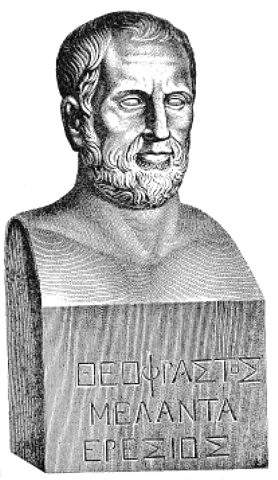
Théophraste, en grec ancien Θεόφραστος (Érésos, Lesbos v.372 av. J.-C .– Athènes v.287 av. J.-C.), philosophe grec de l'école du Lycée. D'origine lesbosienne, il s'appelle d'abord Týrtamos. Il part étudier, jeune, la philosophie à Athènes. Il est l'élève de Platon puis d'Aristote, qui le surnomme Θεόφραστος, « divin parleur ». Aristote en fait également son successeur à la tête du Lycée. À ce poste, il a plus de deux mille élèves, si l'on suit la tradition, dont le poète Ménandre.
Sa spécialité est les sciences naturelles, et plus spécialement la botanique, sujet de deux ouvrages, Histoire des plantes et Causes des plantes. C'est lui qui est à l'origine de la différenciation théorique entre règne animal et règne végétal, distinction qui permet la naissance d'une véritable nouvelle discipline : la botanique. Son Histoire des plantes traite de la morphologie et de la classification des végétaux. Théophraste donne également des informations sur leur utilisation.
Les Causes des plantes aborde des problèmes sur la physiologie végétale notamment sur la croissance et la reproduction. Pour cela, il forge un vocabulaire descriptif spécifique qui lui permet de décrire les différentes parties d'une plante. Dans ses écrits, il mêle observations personnelles et connaissances des auteurs anciens ou de son temps. Théophraste évoque aussi des espèces lointaines qui ont été rapportées après les conquêtes d'Alexandre le Grand ou qu'il reçoit d'Égypte. Il mentionne en tout plus de 550 espèces que l'on peut encore identifier, la plupart sont utiles à l'agriculture. Théophraste les classe en quatre groupes : les arbres, les arbustes, les arbrisseaux et les herbes (c'est-à-dire les végétaux non-ligneux). Il est conscient de l'aspect arbitraire de ce système et convient qu'une plante peut être classée dans plusieurs groupes. Après Théophraste et jusqu'à la Renaissance, les études botaniques ne sont plus que la reprise des travaux anciens sans éléments novateurs.
Il est également
l'auteur d'un traité Sur les pierres et de Caractères dont s'inspire,
plusieurs siècles plus tard, Jean de La Bruyère. D'après Diogène Laërce![]() (V, 42 -
50), Théophraste a écrit 230 850 lignes. Il donne les titres suivants:
(V, 42 -
50), Théophraste a écrit 230 850 lignes. Il donne les titres suivants:
|
Callisthène ou du Deuil |
De la Comédie (de la poésie) |